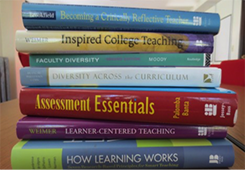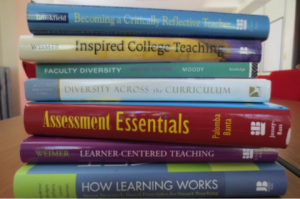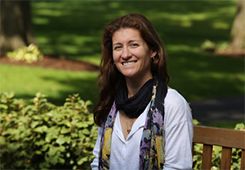
Summer Reading Picks: Reflecting on Teaching
Summer is a perfect time for reflecting about teaching as you consider how to approach your next courses. The CELT library offers a wide selection of books on all aspects of teaching that offer tried and true methods as well as innovative ideas to stimulate your thinking. For your summer reading pleasure, we highlight some below.

Donna Qualters, Director of CELT
Becoming a Critically Reflective Teacher, Stephen Brookfield (Jossey-Bass, 1995)
This is an “oldie but goody” and one of my most memorable reads. Stephen Brookfield believes that good teaching = whatever helps students learn. In his eyes, there are no magic bullets to be a successful teacher, but there are practices that promote continual growth and learning. The goal of the Critically Reflective Teacher is to demystify the process of reflection and help us gain an increased awareness of our teaching through the analysis of a critical incident from our own practice and to review it from as many different angles as possible. To this end, Brookfield proposes four lenses that can be utilized by teachers in a process of critical reflection: (1) the autobiographical, (2) the students’ eyes, (3) our colleagues’ experiences, and (4) theoretical literature. These lenses allow us to self-reflect, to seek student feedback, to engage our peers, and seek evidence based literature. This book won’t tell you how to teach but it will make you a better teacher!
Annie Soisson, Associate Director of CELT with a special focus on faculty development programs and inclusive excellence
Creating Self-regulated Learners: Strategies to Strengthen Students’ Self-Awareness and Learning Skills, Linda Nilson
What are self-regulated learners anyway? With the explosion of knowledge, Linda Nilson emphasizes that our role as teachers must evolve into helping students become lifelong learners. The role of content, while still essential, is not enough. As faculty, we are professional learners, but how do we teach our process to students? Nilson creates a compelling argument that we need to consciously construct opportunities for our students to become intentional, independent and self-directed learners. This very practical book is full of concrete suggestions for how to help students integrate a sequenced series of practices that will help them understand how to take responsibility for their own learning.
Alicia Russell, Associate Director of CELT with a special focus on educational technology and learning spaces
The Online Teaching Survival Guide: Simple and Practical Pedagogical Tips by Boettcher and Conrad
Although it was written in 2010, this book is still an excellent resource for teachers who are new to teaching online, as well as those who want to refine their skills. Boettcher and Conrad are gifted teachers who share their own expertise as well as experiences of other seasoned educators. The book begins with a brief crash-course in learning theory and how it relates to building an effective online learning environment. The authors divide the online course into phases – beginning, early middle, late middle and wrap up, and offer best practices for engaging students in each phase. Importantly, it points out how to create “online presence” and build community among learners. I found the book invaluable when I taught online, continue to turn to it for strategies for flipping learning.”
Ed Morgan, Associate Director of CELT with a special focus on assessment
Learner-Centered Teaching, Maryellen Weimer (2002).
Each semester I have taught, I face the same questions: what will the students learn, how will they learn, what can I do to incite more learning among more of the students, and most importantly what will these students remember five years from now. Weimer offers five sustainable changes (all practical and reasonable) in teaching and learning to adjust courses to focus on these sorts of questions. Weimer identifies what changes when teaching is student centered (the balance of power, the function of content, the role of the teacher, the responsibility for learning and the purpose and process of evaluation) and offers guidance for implementing the changes. Weimer’s style is friendly and engaging, making this an ideal summer read.
You can also view an annotated bibliography of all of CELT’s books. If you’d like to check out one of these books, feel free to stop by CELT, 108 Bromfield Road. Or send us an email and we’ll put the book in campus mail for you.
Happy reading!


